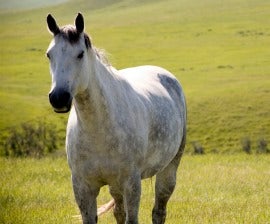-

istock
Researchers with the Universidad Nacional Autonoma de Mexico found horsemeat present in raw and cooked samples sold as beef or unclearly labeled in butcher shops, markets and informal selling points such as street stalls in six Mexican cities.
The study, commissioned by Humane Society International, also found high levels of clenbuterol in some raw meat samples. Clenbuterol, a veterinary drug commonly prescribed for horses, is not approved for food producing animals, and can be harmful to humans.
Researchers collected samples in the following cities: Aguascalientes, Zacatecas, Chihuahua, Mexico City, Pachuca and San Vicente Chicoloapan. The researchers studied 433 samples of cooked and raw meats, and surveyed 339 vendors. More than 40 of the samples collected tested positive for horsemeat. Researchers analyzed clenbuterol presence in 29 of the samples that tested positive for horsemeat (only raw meat could be analyzed for clenbuterol). They found significant clenbuterol concentrations in nearly all the tested samples.
The researchers also found that the majority of the vendors surveyed did not want to sell horsemeat and were unaware of the presence of horsemeat in the meat products they were selling.
Anton Aguilar, HSI/Mexico director, said: “The results of this study show that it is important for consumers to realize that meat mislabeling may occur and can be hazardous for their health, especially because the majority of vendors surveyed in the study were unaware that they were selling horsemeat as beef. We hope this study helps shed some light into the industry.”
The study only tested samples for the presence of clenbuterol, but other toxic substances may have been present. Horses often receive multiple chemical substances that are known to be dangerous to humans, are untested on humans, or are specifically prohibited for use in animals raised for human consumption.
In addition to the health effects involving the consumption of horses not raised for meat, the horse slaughter industry is inherently cruel. Unwanted horses, formerly used in racing or as riding companions, are sold to exporters who then pack them into semi-trucks and transport them long distances often under hot weather conditions with little or no food, water or veterinary care.
Mexico is the second largest horsemeat producer in the world, after China. According to the Mexican Ministry of Trade, in 2015 Mexico exported almost 3,000 tons of horsemeat worth almost $9 million, mainly to Vietnam and Russia. Many of the horses slaughtered in Mexico are imported from the United States – where horse slaughterhouses have been closed since 2007 following the withdrawal of funding for US Department of Agriculture slaughter plants inspections.
Media contact: Raúl Arce-Contreras, rcontreras@humanesociety.org, +1-301-721-6440
